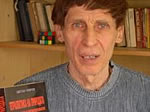 Tsvetan Ivanov's philosophy of life is very clear: “Helping each other makes us all stronger,” he says. “Looking after number one is not a policy I agree with.”
Tsvetan Ivanov's philosophy of life is very clear: “Helping each other makes us all stronger,” he says. “Looking after number one is not a policy I agree with.”
Tsvetan worked for 25 years in the local chemical fertiliser plant in Vratsa, north-western Bulgaria, where he supervised safety procedures, before qualifying for early retirement in 2000. He soon decided that he wanted to do something active to help other people in his community. Vratsa is a picturesque town known for its spectacular rock climbing cliffs and caves. But many young families move away to find work, sometimes leaving elderly parents or disabled relatives rather isolated.
In 2008 he heard about the project Through Social Services, for Decent Living, run by a local NGO Most (bridge), and co-funded by the European Union through the European Social Fund. It trains and hires retired and unemployed people to act as social assistants, providing daily support to 40 people living in their own homes, but unable to manage by themselves and needing long-term care.
After a brief training period, covering first aid, counselling skills and dealing with emergencies, Tsvetan was offered a contract and given responsibility for two clients: 87-year-old Nicola Kotsev, and Emil Ginev, a former architect who suffered a leg amputation following a car crash. He visits them every day, helping to keep their homes clean and do their shopping. He may be needed to help with doctors' visits, or do routine administrative jobs like paying utility bills. At lunchtime he collects their meals from the social services canteen, which prepares 200-300 meals a day for people on social welfare. Sometimes he takes Nicola out in his wheelchair, or otherwise just stays with him and keeps him company.
A passion for learning
He has developed a strong personal attachment to his two charges. “Nicola is full of spirit and very alert. He feels a lot better when I talk to him,” says Tsvetan. “He needs medication following a stroke. But he has all his senses and he refuses to give up. The most interesting aspect of the job is getting a psychological insight into how people cope with hardship. What I like is that I learn things, and the more I learn, the more I can do to help people. You get to understand how they feel about many issues, like ageing and even death.” He first volunteered as a social assistant for an earlier project, funded by the United Nations throughout Bulgaria, covering 210 people in the Vratsa region.
Tsvetan has always been an independent thinker, with a wide range of interests. A chemistry graduate, he spent 15 years after university working in the construction trade and helping to restore icons and murals in the famous Cherepish Monastery, near Vratsa. At one time he was “addicted” to solving the Rubik Cube puzzle – he still has several of the most difficult versions on his shelves. When he discovered the internet, it too became a passion. “I had to force myself to go out,” he admits. In 2007 he published his first book, expounding his own philosophical theory of The Tetralectics of Nature.
It reflects his interest in all aspects of the natural world. As he works on his computer, one or two of the six cats he has rescued from the streets curl up on his lap or cling to his shoulders. “When you treat animals well, they start to trust you, just like people,” he explains. Plants fill the window of the modest living room which doubles as a bedroom. His personal library fills the small flat, with perhaps 6,000 volumes on a multiplicity of topics. “I've read them all,” claims Tsvetan proudly. He belongs to a local philosophy society, and has published some 150 articles.
Mutual affection
Seventy-seven-year-old Velika Mamkova is another beneficiary of the Decent Living initiative. She is housebound on crutches, following surgery and a broken leg. Her two sons have families of their own and have moved away – one to work in Italy. “The help is very important. There are things I cannot do for myself and I would not be able to cope without it,” she says. “If a problem comes up, I know I can always phone, 24 hours a day.” She also relies on the human contact – having someone to talk to each day – and has developed a close relationship with her carer, Maryika Mitova.
The affection is mutual. “She's like a mother to me,” confesses Maryika, who is also employed by the Decent Living scheme. The social assistants work six hours a day and receive a salary from the project budget. But as a pensioner himself, Tsvetan pays no tax and is entitled to free health care, which in turn saves money for the project. The role of the 10 social assistants is to support the 10 full-time care workers employed by the local authority.
His contract lasts for a year – the duration of the scheme. He hopes it can be renewed, saying it would be a pleasure to continue the work. “Through this project I give people hope. I can see that they are willing to go on living and not give up. It gives me an extra income so that I can live a decent life, and in turn I can help others to live decently. Since I have been talking to Nicola he has become more hopeful and has tried to start walking again. It's cheered him up. So while it's been useful for me, I have been useful to him as well.”
